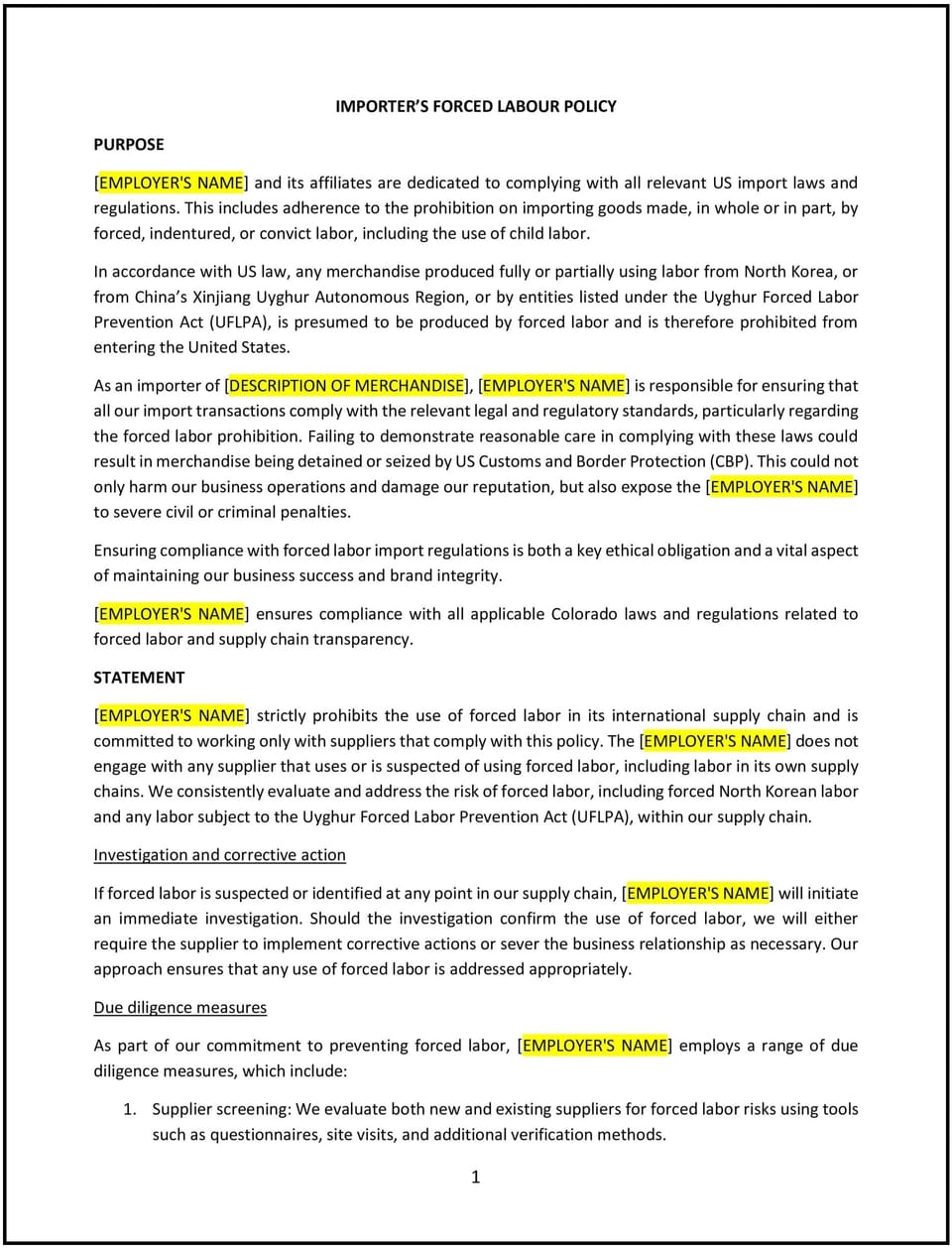Importer's forced labour policy (Colorado): Free template

Importer's forced labour policy (Colorado)
In Colorado, an importer’s forced labour policy establishes guidelines for identifying and preventing the use of goods produced through forced labor in the supply chain. This policy helps businesses comply with federal and state regulations, including the U.S. Customs and Border Protection (CBP) enforcement of the U.S. Tariff Act, and demonstrates the business's commitment to ethical sourcing and human rights.
By implementing this policy, Colorado businesses can ensure that their supply chains are free from forced labor, protect their reputation, and mitigate legal risks.
How to use this importer’s forced labour policy (Colorado)
- Identify high-risk suppliers: Establish procedures to assess and monitor suppliers, particularly those operating in regions with a higher prevalence of forced labor practices.
- Conduct due diligence: Require suppliers to complete detailed questionnaires or certifications verifying compliance with forced labor laws and ethical sourcing standards.
- Monitor the supply chain: Implement audits and inspections to ensure suppliers adhere to ethical labor practices, and document findings for accountability and transparency.
- Establish corrective action plans: Define processes for addressing any violations of the policy, including supplier warnings, remediation measures, or termination of contracts.
- Collaborate with stakeholders: Work with suppliers, industry groups, and human rights organizations to improve supply chain transparency and address forced labor risks collectively.
- Train employees: Educate procurement and compliance teams on identifying forced labor risks and ensuring that sourcing practices align with the policy.
Benefits of using this importer’s forced labour policy (Colorado)
This policy offers several advantages for Colorado businesses:
- Supports ethical practices: Demonstrates the business’s commitment to human rights and ethical sourcing, improving trust with customers and stakeholders.
- Reduces legal risks: Helps the business comply with federal laws prohibiting the importation of goods made with forced labor, mitigating penalties or customs enforcement actions.
- Protects reputation: Aligns the business with socially responsible practices, enhancing its brand image and consumer confidence.
- Improves supply chain accountability: Establishes clear standards for suppliers, encouraging ethical practices and reducing operational risks.
- Strengthens stakeholder relationships: Builds trust with clients, investors, and regulators by ensuring the business upholds its ethical and legal obligations.
Tips for using this importer’s forced labour policy (Colorado)
- Reflect Colorado-specific considerations: While forced labor laws are federally regulated, ensure the policy aligns with any additional state-level guidelines or consumer expectations in Colorado.
- Leverage technology: Use supply chain management tools to track and verify supplier compliance with forced labor regulations.
- Engage suppliers: Collaborate with suppliers to ensure they understand the business’s expectations and provide the resources needed to meet compliance requirements.
- Regularly review practices: Update the policy as needed to address changes in federal enforcement priorities or new findings in the global labor landscape.
- Document compliance efforts: Maintain detailed records of supplier audits, certifications, and other due diligence activities to demonstrate the business’s commitment to ethical sourcing.
Q: How does this policy benefit the business?
A: This policy helps the business maintain compliance with forced labor laws, protect its reputation, and build trust with stakeholders by promoting ethical sourcing practices.
Q: What steps should the business take to ensure compliance with forced labor regulations?
A: The business should conduct thorough supplier audits, implement due diligence processes, and maintain documentation to verify that goods are sourced ethically and comply with federal laws.
Q: How can the business address forced labor violations in the supply chain?
A: The business should establish corrective action plans, including engaging with the supplier to resolve issues or terminating the relationship if violations persist.
Q: How does this policy align with Colorado-specific concerns?
A: While the policy is primarily driven by federal regulations, it supports Colorado businesses in meeting the expectations of socially conscious consumers and maintaining alignment with ethical business practices.
Q: How should the business train employees on this policy?
A: The business should provide regular training to procurement and compliance teams, ensuring they understand how to identify forced labor risks and enforce the policy effectively.
This article contains general legal information and does not contain legal advice. Cobrief is not a law firm or a substitute for an attorney or law firm. The law is complex and changes often. For legal advice, please ask a lawyer.


